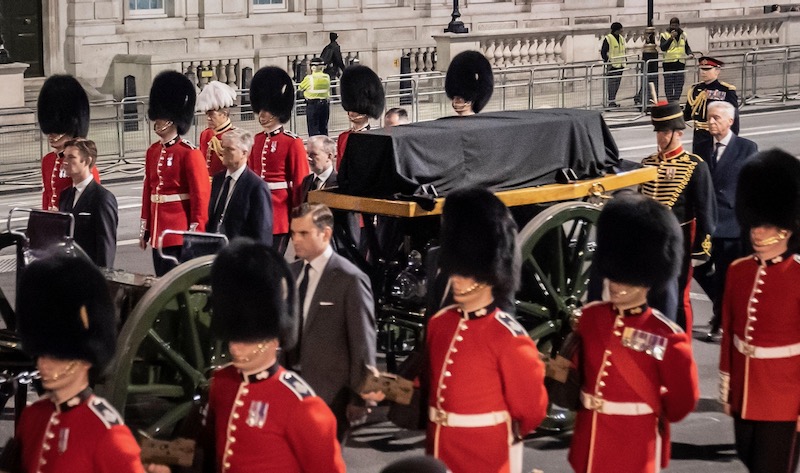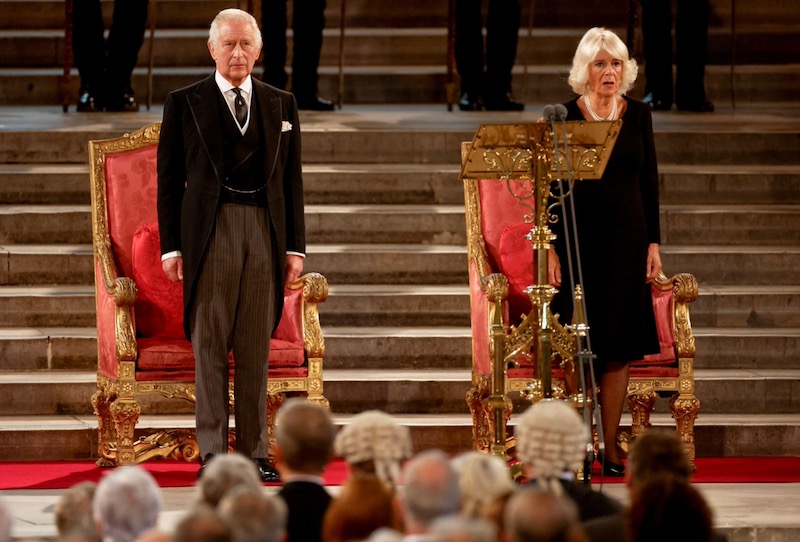The Queen’s death, may she rest in peace, is a hugely significant moment for all of us in this nation and abroad, partly because she has been The Queen for the whole of most of our lives. I was thinking about this a couple of days after we heard the news, and I suddenly realised that the words to the National Anthem had instantly changed. This was quite a shock, though entirely predictable, and probably one of many. I heard this morning that all the “By Appointments” are voided after the sovereign’s death, so even biscuit and cereal packets will have to change.
My mother would have been able to remember singing God save the King because she was the same age as the Queen, although sadly she did not live quite as long. On the other hand, my grandmother was only two when Queen Victoria died, and therefore highly unlikely to have sung God save the Queen until Elizabeth II came to the throne. Like the Queen and my mother, she lasted into her nineties (we're a longlasting stock on the female side), so she would have sung God save the Queen almost as often as she sang God save the King. I will never be able to equal this, and my children will probably end up singing God save the King more often, across the course of their lives. It’s a strange thought.
There have been few reigning Queens in our history (for all sorts of reasons, not just sexist ones), but they have each ruled for longer than most of the kings, once we are past Queen Anne. Elizabeth II at 70+ years and Victoria at 63+ are streets ahead of anyone else except George III (59+), and nearly all the other kings are in the twenties or fewer, with George II an exception at 33+. I was struck to wonder whether this meant that God save the Queen was less historically exceptional than I had reckoned, so I worked out some rough figures, and the gap is not as big as you might expect (roughly 140+ years of God save our gracious Queen to 212+ for God save our gracious King). I have not included William and Mary in the counts because although she was the Queen in her own right by succession, she died after nearly six years, and William carried on as King for another eight years (which would not have been an option if the genders had been reversed). Also, I have no idea how people sang the words while they were both on the throne, though as an ever-resourceful Church musician, I could offer adaptations to fit the music for the first three lines. Something like God save the King and Queen, Long live the King and Queen, Long may they reign, and you can go on from there. It’s not, after all, a wonderful piece of verse. It is in fact a prayer, which I suspect is why some people don’t like it, but a prayer is a better form for a National Anthem to take than many of the alternatives.
The reason why the frequencies of God save the King and God save the Queen are so close together is simply because it is a very modern piece of music (historically speaking), thought to have been performed originally around 1619. So I don’t need to go back beyond James I, and there is even the possibility that it was actually meant to be subversive (applied to the various other claimants to the throne at that time; there’s even a suggestion that the tune might have a plainchant origin, making another possible link with the Catholic royal line). Elizabeth I had a long reign compared with the males of her line, but she’s outside my calculations.
It’s a very modern piece of music; and it’s completely unofficial. In this country we don’t have an official National Anthem; we don’t even know who wrote either the tune or the words, although various suggestions have been made. I find this endearingly British. There are various versions, but by roughly 1744, there was a version current which is very similar to the present one (just in time for Bonnie Prince Charlie, yet more evidence that it’s another Catholic plot). One consequence of its not being official is that other countries have felt free to adopt the tune themselves, the most famous example probably being the Americans with My country, ’tis of thee. It is always sung with great respect and emotion, but again the words aren’t wonderful.
I was surprised to find that although I can sing God save the King without too much trouble, the pronouns crept up on me. I’d thought that once I got the first few lines right, the rest would follow, but singing “send him victorious” needs me to be paying real attention. It’s like trying to use inclusive language in the psalms; it’s always the pronouns which catch you out.
On the other hand, people so easily get the words wrong! I listened very carefully (by radio) when the choir was singing it in St Paul’s about the new King, for the first time, at the first service arranged to mark the Queen’s death. The usual words are “our” whenever there is an adjective, so “our gracious”, “our noble”; but “the” when there isn’t, which makes sense. But in St Paul’s, they sang “our” all the time, which sounds wrong and is weaker.
When I was younger, the National Anthem seemed to crop up more often. It was always played at the end of the main film in a cinema, an auditory indication that it was time to go home. It used to be on the radio and the television as the last thing before they shut down for the night. It was played in the morning on the radio for royal birthdays, but I remember that Prince Charles and Prince Philip got only half (the bit before the run up the scale). It has never been traditional in the UK for the National Anthem to be sung at school every morning, though many other countries do this as a way of making sure that everyone can sing it, and most of our children can still manage the Kenyan National Anthem (only in English, sadly), because they went to primary school there. In these islands we combine a more casual approach with still expecting people to know it.
It’s always fun to hear how it is played in other countries. Military bands tend to do a good job, others not necessarily, and sometimes (as in the Olympics) it can become clear that the band or orchestra has the wrong music entirely, but you must never laugh. Or get offended; people are honestly trying to pay you the compliment of playing your anthem, and you must take it in the spirit in which it is meant. Another danger can be when the band plays it at a pitch which may be easier for them (there is a very high “Military Band” version), but makes singing it almost impossible. Again, you never laugh, but you may end up looking slightly agonised. This is another point with which church musicians are familiar; you can’t change the key of something just to make it easier to play when the important point is whether people can sing it. The National Anthem is usually in G, and I wouldn’t go any higher; F would actually be more comfortable for most people, though not most instruments.
After years of diplomatic life and an amateur production of The Hollow Crown, I know (nearly) all the verses, but most people only need one. You do need the one though; it’s always sad to see people unable to join in, and consequently feeling unincluded. Choosing not to join in is something else entirely, but you need to be able to sing the words if you are going to take a stand on not singing them. A National Anthem, like religion, education or philanthropy, needs active participation, something you do rather than just watch. Ours, because it is simple and repetitive, is easy to memorise. It’s actually quite clever, how it repeats with just enough variation to keep you paying attention, with the different adjectives and the “our” and “the” distinction I mentioned earlier. There have been other versions, including a “Peace” one from 1919, which I rather like as it manages to include Shakespeare’s silver sea and prayers for both “our land” and “us all” in the second and third verses.
One unexpected consequence of changing the words is how much more fierce and martial it sounds with male pronouns and a King. I wonder whether this will possibly give a fair wind to the Peace version, or whether we will all become so used to it that we don’t notice. None of the other alternative versions (although several have been suggested) has stuck, possibly because we usually sing only the first verse and the fierceness comes in later.
It must be daunting for the new King, who will, like the rest of us, have been used to the old version, and will have sung it at occasions so many times. Now he won’t actually sing it any more, which I imagine will be a relief at this stage. Music has a way of getting under your guard when you are mourning, and I couldn’t join in any hymns at all for a while after my mother died. Being able to listen without joining in and risking your voice cracking, as so often at funerals, and also knowing that it is a prayer for you, must I hope at least be comforting.
Kate Keefe composes musical settings for the Mass and writes about the psalms. You can follow her on Facebook, Twitter and LinkedIn.



 Loading ...
Loading ...
What do you think?
You can post as a subscriber user ...
User comments (1)